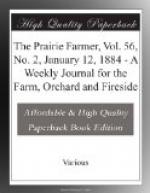AGRICULTURAL ORGANIZATIONS.
[Officers and members of farmers’ organizations of all kinds are invited to send for publication in this department notices of meetings, time of holding fairs, and other pertinent information. We desire to make of it a weekly bulletin that shall be looked for with interest by members of clubs, granges, fair associations, and agricultural and horticultural societies.]
The Maine State Grange has elected the following officers: Master, Frederick Robie, of Gorham; Overseer, H.E. Gregory, of Hampden; Lecturer, D.H. Thing, of Vernon.
At a meeting of the Wisconsin State Grange resolutions were passed requesting the Legislature to separate the State Agricultural Experiment Farm from the State University, and to locate it in an agricultural district.
At the Vermont State Grange’s annual meeting at Brattleboro, December 13-14, 1883, 72 granges were represented. For the first time since the organization of the grange its doors were opened to the public, and the State Board of Agriculture met with it. Worthy Master Franklin’s address revealed a healthy condition of the Order in Vermont.
The meeting of the Massachusetts State Grange was an excellent one. Master Draper was again re-elected. The committees’ reports and discussions revealed a hearty interest in and sympathy with the experimental station and the agricultural college, but the present system by which the college trustees perpetuate themselves was sharply criticised, and a change in the law was recommended. It was also “Resolved, that as Patrons of Husbandry, we recommend such a change in the law as will withhold the State bounty from all societies that permit liquor selling or gambling at their annual fairs.”
The annual meeting of the Michigan Grange last month was largely attended. The Secretary’s report showed the grange to be in good condition. The committee on the agricultural college recommended the admission of girls to that institution. Reports were adopted recommending the restoration of the duty on wool, so that it shall equal that on manufactured woolen articles; urged that taxpayers be required to make oath to their assessments; recommended the continued fostering of the sorghum industry; condemned the extortionate practices of many millers in the State, urging co-operative mills if necessary to remedy the same, and asks the appointment of a committee to draft a bill similar to the Reagan bill to remedy some of the evils of transportation.




